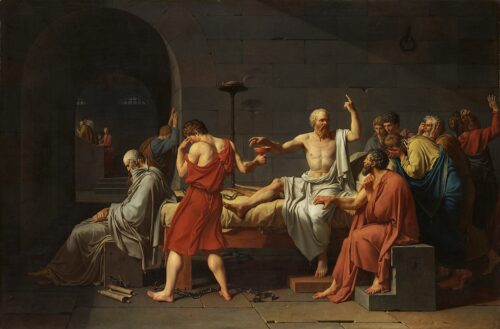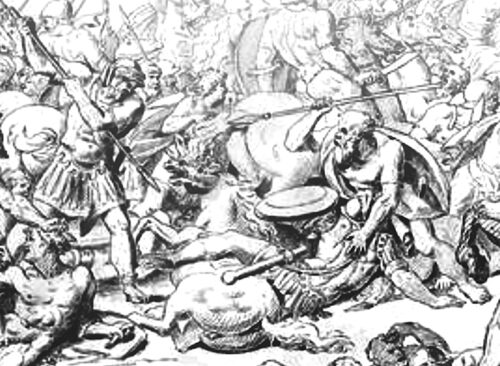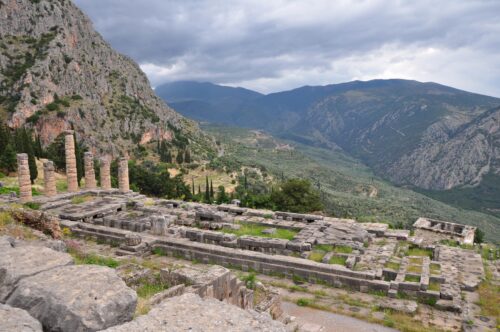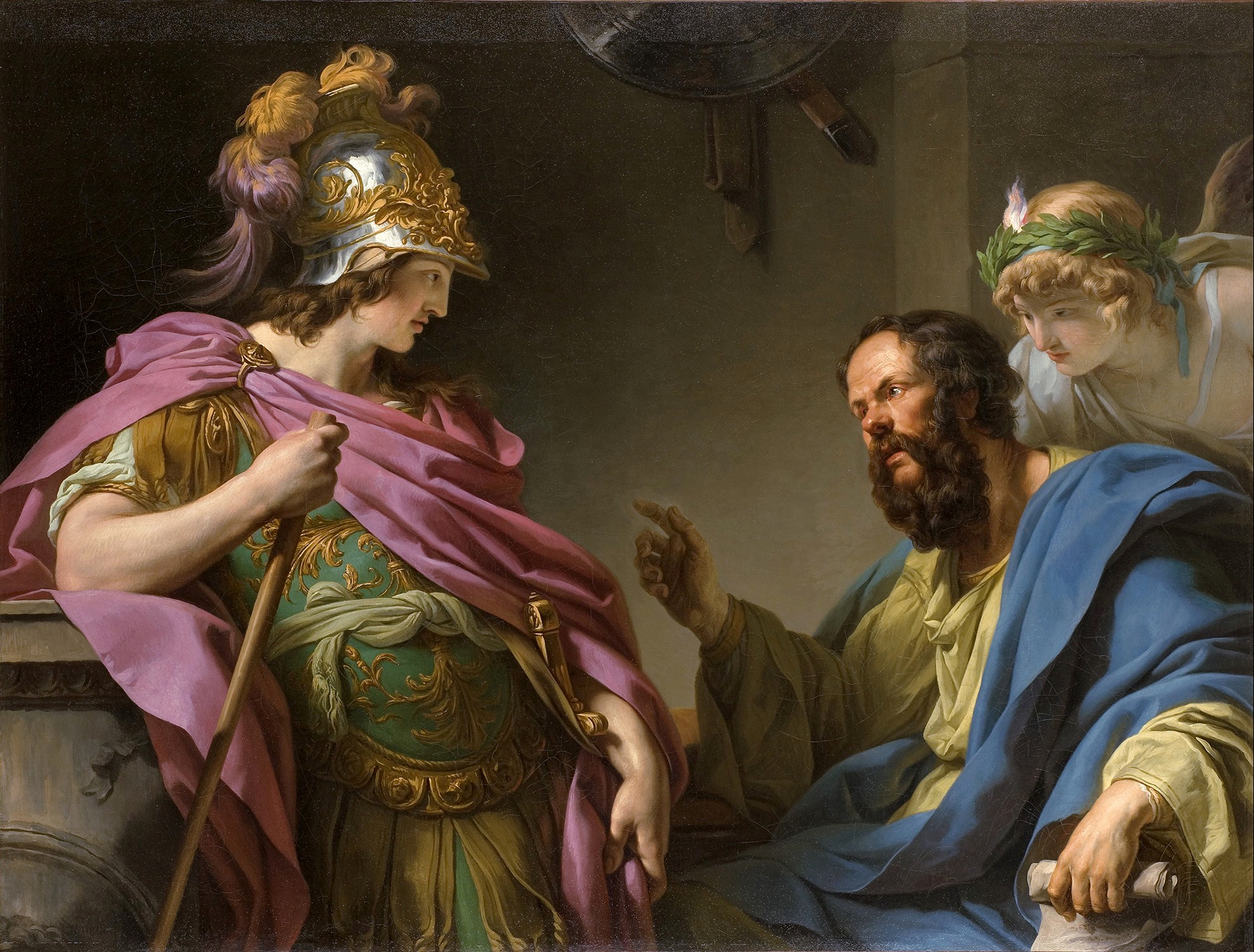“Alcibiades Receiving Instruction from Socrates”, a 1776 painting by François-André Vincent, depicting Socrates’s daimon.
Socrates, born around 470 BC in Athens, Greece, is often regarded as the founder of Western philosophy. He grew up during the golden age of Pericles’ Athens and served with distinction as a soldier. Despite his military service, Socrates is best known as a philosopher and a relentless questioner of everything and everyone.
His unique approach to teaching, known as the Socratic method, did not involve conveying knowledge but rather asking clarifying questions until his students arrived at their own understanding. This method laid the groundwork for Western systems of logic and philosophy.
Socrates wrote nothing himself, so our knowledge of him comes from the writings of a few contemporaries and followers, most notably his student Plato. He was a widely recognized and controversial figure in his native Athens, so much so that he was frequently mocked in the plays of comic dramatists.
In 399 BC, at the age of 70, Socrates was brought to trial on a charge of impiety and sentenced to death by poisoning, probably by hemlock. He accepted this judgment rather than fleeing into exile. His powerful advocacy of the examined life and his condemnation of Athenian democracy have made him one of the central figures of Western thought and culture.

Socrates the Soldier
Socrates served as a hoplite, a heavily armed foot soldier, in the Athenian military. He participated in several campaigns, including the siege of Potidaea, the Battle of Delium, and the Battle of Amphipolis. His bravery and resilience were well-documented, with accounts of him saving the life of Alcibiades, a prominent Athenian statesman, during the Potidaea campaign.

Socrates’ military experiences had a profound impact on his philosophical ideas. Here are several significant ways in which his tenure as a soldier shaped his philosophical perspectives.
1. Virtue and Courage
In Socratic philosophy, virtue (or “arete” in Greek) is the highest form of excellence and the ultimate goal of life. Socrates believed that virtue is the most valuable of all possessions, for it is through virtue that one can achieve eudaimonia, a state of lasting happiness and fulfillment.
Courage, or “andreia” in Greek, is one of the four cardinal virtues in Socratic philosophy, alongside wisdom, temperance, and justice. For Socrates, courage was not merely physical bravery in the face of danger but also moral courage—the ability to stand up for what is right, even in the face of adversity.
Socrates viewed courage as an integral part of virtue. He argued that true courage is not about reckless bravado or fearlessness in the face of danger. Instead, it’s a measured response that’s guided by wisdom and moral understanding. In other words, the truly courageous person is not the one who rushes into danger without thinking, but the one who understands the risks and still chooses to do what is right.
This perspective likely stemmed from his experiences as a soldier, where he would have seen firsthand the difference between reckless bravery and the kind of measured courage that comes from understanding one’s duties and the potential consequences of one’s actions.
Socrates’ concept of courage as a part of virtue represents a profound shift from the traditional Greek view of courage as physical bravery. His military experiences played a crucial role in shaping this philosophical view, highlighting the deep interplay between his life experiences and his philosophical insights. This nuanced understanding of courage — emphasizing moral integrity over physical bravery—continues to influence philosophical and ethical discussions today.
2. The Socratic Method
The Socratic Method, named after Socrates, is a form of dialogue where one person asks a series of probing questions to draw out ideas and underlying presumptions. The goal is not to win an argument, but to stimulate critical thinking and illuminate ideas.
Socrates’ military service likely played a role in shaping the Socratic Method. As a soldier, Socrates would have been trained to question and evaluate his strategies constantly. This practice of questioning and reassessment is a key aspect of the Socratic Method.
In a military context, failing to question one’s strategies can lead to disastrous consequences. Similarly, in a philosophical context, failing to question one’s beliefs can lead to intellectual stagnation and dogmatism.
Just as a soldier question their strategies to improve them, Socrates encouraged individuals to question their beliefs to gain a deeper understanding. This process involves challenging assumptions, examining definitions, and scrutinizing reasoning.
For example, if someone believes that virtue is the highest good, Socrates might ask, “What is virtue?” and “Why is it the highest good?” These questions force the individual to examine their beliefs more closely and, in doing so, gain a deeper understanding of them.
Socrates’ experiences as a soldier, where constant questioning and evaluation were necessary, translated into his unique approach to philosophical inquiry. This method continues to be a powerful tool for stimulating critical thinking and fostering intellectual growth. It serves as a reminder of the importance of questioning our beliefs and assumptions, just as Socrates did centuries ago.
3. The Value of Life
Socrates’ experiences as a soldier, particularly the proximity to death on the battlefield, likely had a profound impact on his views about life. Facing death in battle can lead to a deep contemplation of the value and purpose of life, and for Socrates, it seems to have underscored the importance of living a life of purpose and meaning.
One of Socrates’ most famous assertions is that “an unexamined life is not worth living.” This statement encapsulates his belief that the pursuit of wisdom, truth, and self-understanding is the most important goal in life. More than mere survival, Socrates valued the quest for knowledge and the cultivation of virtue.
In his view, a life lived without questioning, without striving for wisdom and understanding, is empty and meaningless. It’s not enough to simply be alive; one must strive to live a life of depth, purpose, and virtue.
Socrates maintained that the pursuit of wisdom and truth is more valuable than life itself. This belief was not just theoretical; Socrates lived it out in his own life. When faced with the choice between renouncing his philosophical inquiries or facing death, Socrates chose death, thereby demonstrating that he valued the pursuit of wisdom more than his own life.
Socrates’ encounters with death on the battlefield likely led him to value a life lived in pursuit of wisdom and truth above mere existence. His assertion that “an unexamined life is not worth living” continues to challenge us today, inviting us to seek wisdom, question our assumptions, and strive for a life of depth and meaning.

Final Thoughts
Socrates’ military experiences provided him with unique insights that deeply influenced his philosophical ideas. His time as a soldier not only shaped his views on virtue, courage, and the value of life but also informed his unique approach to philosophical inquiry, the Socratic method. Thus, understanding Socrates the soldier is crucial to understanding Socrates the philosopher.
*The views and opinions expressed on this website are solely those of the original authors and contributors. These views and opinions do not necessarily represent those of Spotter Up Magazine, the administrative staff, and/or any/all contributors to this site.
